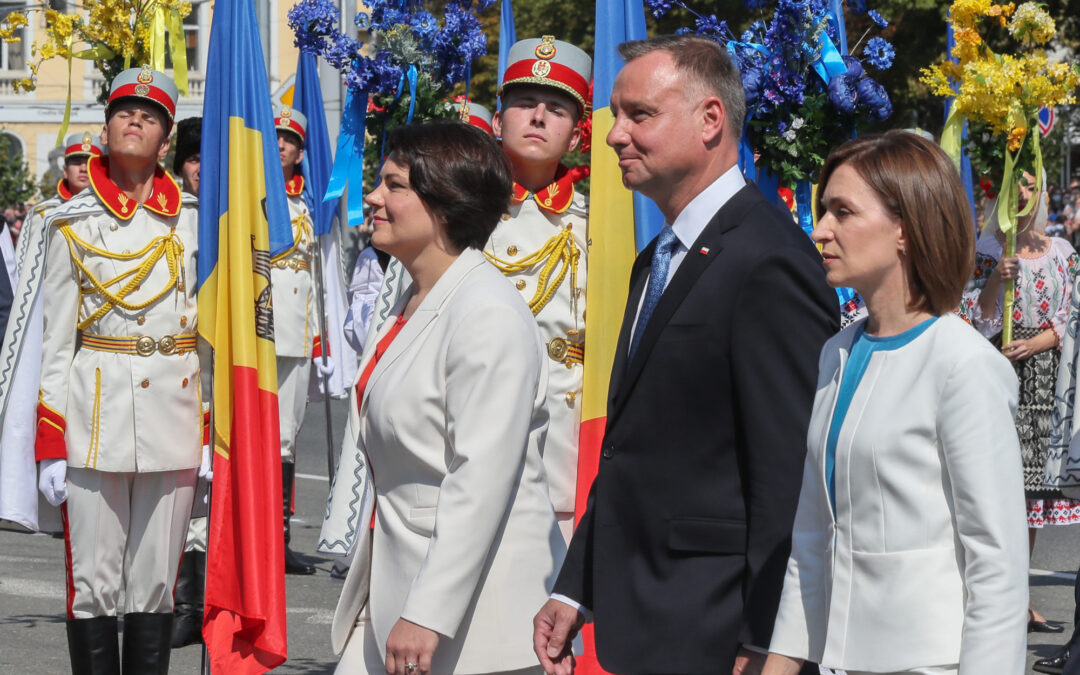Poland’s president has expressed support for Moldova’s bid to join the European Union during a state visit to the country this week. President Andrzej Duda took part in Moldova’s independence day celebrations, as well as talks that also included his Romanian and Ukrainian counterparts.
During his visit, Duda advised Moldova to learn from the Polish government’s judicial reforms. Though its policies have been widely criticised – and some found to be in violation of Polish and European law – Duda argued they have been necessary to purge ex-communist judges, a process that he says must continue.
Prezydent @AndrzejDuda w #Kiszyniów: Cieszę się, że możemy w tej formule rozmawiać o bezpieczeństwie regionalnym, o współpracy, o wzajemnym wsparciu w dziele reform, które bez wątpienia będą przybliżały Mołdawię do Unii Europejskiej. pic.twitter.com/4X5sx1By2A
— Kancelaria Prezydenta (@prezydentpl) August 27, 2021
Speaking in the capital Chișinău yesterday, Duda expressed hope that Moldova’s “dream” of becoming an EU member would come true. He said he was glad that the country was moving “towards full sovereignty and democracy” as well as “towards Europe”.
The comments echoed similar pledges made by Duda in May in Tbilisi during Georgia’s independence day celebrations, when the Polish president said that there was “enough room” in Europe and NATO to accommodate Georgia, Ukraine and Moldova.
In his remarks yesterday, Duda also said that he would like Moldova to become a member of the Three Seas Initiative, an infrastructure and energy pact between 12 countries in Central and Eastern Europe that Poland has been a leading force behind.
Russia is “an aggressor state, not a normal country”, @AndrzejDuda said during a trip to Georgia to mark its independence day
He called for “decisive action from the international community” against Moscow and backed Georgia’s accession to the EU and NATO https://t.co/yON02ene1x
— Notes from Poland 🇵🇱 (@notesfrompoland) May 27, 2021
“It is very important to develop our countries, to build a security zone in our part of Europe, not only military security but also energy security and digital security,” he said.
Duda also pledged to offer Moldova Poland’s guidance on state-building, including fighting corruption and introducing judicial reform. “First of all, Moldova should reform the judiciary as soon as possible, so as to remove from its system discredited judges and prosecutors,” he said.
“One of the goals of Polish justice reforms was to remove people who had a compromising communist past,” said Duda, quoted by wPolityce. “Such people should not be in the Polish judiciary, and unfortunately they are still there.”
"We are still cleansing Poland of all kinds of dirt," said President Duda in an interview with Catholic broadcaster @RadioMaryja as he bids for reelection.
"Certain elements must be removed, replacing them with new tissue." https://t.co/IPwEVXEAXX
— Notes from Poland 🇵🇱 (@notesfrompoland) June 2, 2020
The Polish government’s judicial policies have been condemned by the domestic opposition as well as a range of international organisations – including the EU – which say that they have undermined the rule of law. The country has fallen rapidly in international democracy rankings.
But Duda, speaking in Moldova, said that western countries and institutions “do not understand” the reforms, despite the fact that “we tried to explain it to them”. Last year, the president warned the EU to stop lecturing “us in foreign languages” and pledged to continue “eliminating black sheep among judges”.
Ahead of the visit to Chișinău, senior presidential aide Jakub Kumoch said that “Moldova was very much affected by the pathologies of the oligarchic system” but has “started reforms very energetically”. Poland would “support this transformation”, said Kumoch.
On Thursday, deputy foreign minister Marcin Przydacz tweeted that Duda had shared Poland’s “unique experience of fighting corruption” as well as closing tax loopholes, and would support similar reforms in Moldova.
Main image credit: Marek Borawski/KPRP/Prezydent.pl

Maria Wilczek is deputy editor of Notes from Poland. She is a regular writer for The Times, The Economist and Al Jazeera English, and has also featured in Foreign Policy, Politico Europe, The Spectator and Gazeta Wyborcza.




















